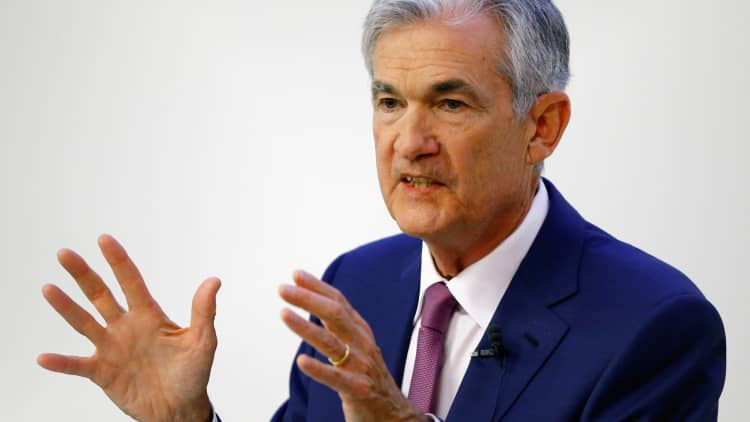
The Federal Reserve conducted a repurchase operation Tuesday involving $53 billion worth of various debt instruments as it seeks to control the level of its benchmark interest rate. It was the first such move in a decade.
Wall Street was abuzz Tuesday with talk about a breakdown in the funding markets that could lead the Fed to restart its controversial quantitative easing program, and possibly to make other adjustments.
The "repo" move, comes a day after market turmoil in which rates spiked at record levels and worries grew that the Fed was losing control of its benchmark rate. The repo markets serve as short-term plumbing that runs the financial market's operating systems. In extreme cases, breakdowns can lead to financial crises such as the one that engulfed Wall Street in 2008 when overnight lending dried up between big Wall Street institutions.
The repo market "broke" Monday while the jump in the Fed's overnight funds rate to the top of its target range of 2% to 2.25% "raise questions about the Fed's ability to control money markets," Mark Cabana, rates strategist at Bank of America Merrill Lynch, said in a note.
The New York Fed trading desk had set a target of up to $75 billion in securities. An effort Tuesday to run a 15-minute operation at 9:30 am had to be postponed due to technical difficulties but had resumed at 9:55 am, concluding at 10:10 am.
The purchases involved about $40.8 billion of Treasurys, $11.7 billion in mortgage-backed securities and $600 million in agency debt. The Treasurys and MBS, which constitute the bulk of the Fed's balance sheet, had low yields of 2.1% each, while the agency low yield was 3%. The Treasurys and MBS were within the Fed's target range of 2%-2.25%.
Rates spike, the market worries
Repurchase operations in the bond market spun wildly Monday, with the overnight repo rate surging to as high as 8.5% while the Fed's own funds rate hit the top end of the current target range of 2.25%.
News that the Fed was conducting the repo operation to bring some liquidity to the debt markets, was welcomed.
"It's certainly a good start," said Lou Crandall, chief economist at Wrightson ICAP.

The repo rate surge happened amid concerns about dollar funding supplies critical to making the short-term operations work. Corporate tax payments, due on Sept. 15, are the source of some of the issues in the market, according to various sources.
Other issues involved the continued inversion of the yield curve, with 3-month Treasurys higher than the 10-year; high Treasury note issuance following the debt ceiling extension in Congress, and conflicting bank capital requirements.
"It's pretty serious — not an existential financial system crisis, but it's pretty serious," said Guy LeBas, chief fixed income strategist at Janney Montgomery Scott. "The issue that worries me more is when financial rates spike like this, unpredictable events start to come up ... random things that tend to precipitate financial crises. Higher financing rates means the marginal borrower gets pushed out of the financial markets. It creates an opportunity for those problems to emerge."
Market experts indicated that aside from Tuesday's operations, which should quell market disruptions over the short term, the Fed will need to explore further avenues, which could include more quantitative easing just a month after the central bank halted its balance sheet reduction.
Sentiment has arisen that although the Fed has expressed a desire to allow bank reserves to stay high that it may have to expand the balance sheet again to provide banks with more reserves.
A 'material disruption'
"There are likely a bunch of technical factors at work here but it underlines our view that the Fed has reduced the level of reserves enough/too much and will need to start growing its balance sheet again soon, while potentially also adding open market operations and eventually putting in place a repo facility to provide a backstop for funding markets when funding pressures get too tight," said Krishna Guha, head of global policy and central banking strategy at Evercore ISI.
Guha said the repo rate spike caused "material disruption" to markets and said he thinks the Fed will announce this week that it will start growing its balance sheet by up to $14 billion a month. The policymaking Federal Open Market Committee concludes its two-day meeting Wednesday amid market expectations of another 25 basis point cut in its benchmark overnight borrowing rate.
However, the committee also might be pushed into lowering the rate it pays on excess serves. The IOER is used as a lever to keep the funds rate in check but has occasionally run below the benchmark.
To be sure, strategists at Wells Fargo said such disruptions happen around the end of months, quarters and years, though it's unusual to see it in mid-month.
"Nonetheless, we do not think this is indicative of funding stress among the banks. While this may be temporary or a fluke, it could still be a red flag of an unusual occurrence that investors should be mindful about in the short-term," analyst James Strecker said in a note.


